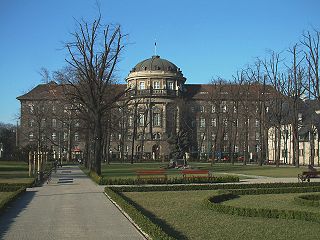 W
WPolonophobia, also referred to as anti-Polonism,, and anti-Polish sentiment are terms for a variety of negative attitudes, prejudices, and actions against Poland, its people and its culture. These include ethnic prejudice against Poles and persons of Polish descent, other forms of discrimination, and state-sponsored mistreatment of Poles and the Polish diaspora.
 W
WDrang nach Osten is the motto of the 19th century German nationalist movement, that refers to the idea of German territorial expansion towards Eastern Europe into the lands of Slavic nations. In some historical discourse, Drang nach Osten combines historical German settlement in Central and Eastern Europe, medieval military expeditions like those of the Teutonic Knights, and Germanisation policies and warfare of modern German states such as those that reflected Nazism's concept of Lebensraum.
 W
WThe Generalplan Ost, abbreviated GPO, was the Nazi German government's plan for the genocide and ethnic cleansing on a vast scale, and colonization of Central and Eastern Europe by Germans. It was to be undertaken in territories occupied by Germany during World War II. The plan was attempted during the war, resulting indirectly and directly in the deaths of millions by shootings, starvation, disease, extermination through labor, and genocide. But its full implementation was not considered practicable during the major military operations, and was prevented by Germany's defeat.
 W
WThe Holocaust, also known as the Shoah, was the World War II genocide of the European Jews. Between 1941 and 1945, across German-occupied Europe, Nazi Germany and its collaborators systematically murdered some six million Jews, around two-thirds of Europe's Jewish population. The murders were carried out in pogroms and mass shootings; by a policy of extermination through work in concentration camps; and in gas chambers and gas vans in German extermination camps, chiefly Auschwitz, Bełżec, Chełmno, Majdanek, Sobibór, and Treblinka in occupied Poland.
 W
WThe Immigration Act of 1924, or Johnson–Reed Act, including the Asian Exclusion Act and National Origins Act, was a United States federal law that prevented immigration from Asia, set quotas on the number of immigrants from the Eastern Hemisphere, and provided funding and an enforcement mechanism to carry out the longstanding ban on other immigrants.
 W
WDuring World War II, 20,000–50,000 mostly Polish and Soviet children were abducted from their homes and forcibly moved to Nazi Germany for the purpose of Germanization, or indoctrination into becoming German. According to Dirk Moses' estimate, 20,000 children were abducted for such purposes from Poland, 20,000 from the Soviet Union, and 10,000 from Western Europe and Southeast Europe. The aim of the project was to acquire and "Germanize" children with purportedly Aryan-Nordic traits, who were considered by Nazi officials to be descendants of German settlers that had emigrated to Poland. Those labeled "racially valuable" were forcibly Germanized in centres and then sent to German families and SS Home Schools.
 W
WThe Ku Klux Klan is an organization that expanded operations into Canada, based on the second Ku Klux Klan established in the United States in 1915. It operated as a fraternity, with chapters established in parts of Canada throughout the 1920s and early 1930s. The first registered provincial chapter was registered in Toronto in 1925 by two Americans and a Torontonian. The organization was most successful in Saskatchewan, where it briefly influenced political activity and whose membership included a member of Parliament, Walter Davy Cowan.
 W
WThe Highland Lute is the Albanian national epic poem, complete and published by the Albanian friar and poet Gjergj Fishta in 1937. It consists of 30 songs and over 17,000 verses.
 W
WThe German concept of Lebensraum comprises policies and practices of settler colonialism which proliferated in Germany from the 1890s to the 1940s. First popularized around 1901, Lebensraum became a geopolitical goal of Imperial Germany in World War I (1914–1918) originally, as the core element of the Septemberprogramm of territorial expansion. The most extreme form of this ideology was supported by the Nazi Party (NSDAP) and Nazi Germany until the end of World War II.
 W
WThe Prussian Settlement Commission was a Prussian government commission that operated between 1886 and 1924, but actively only until 1918. It was set up by Otto von Bismarck to increase land ownership by Germans at the expense of Poles, by economic and political means, in the German Empire's eastern provinces of West Prussia and the Posen as part of his larger efforts aiming at the eradication of the Polish nation. The Commission was motivated by anti-Polish sentiment, bigotry, and prejudice.
 W
WThe racial policy of Nazi Germany was a set of policies and laws implemented in Nazi Germany (1933–45) based on a specific racist doctrine asserting the superiority of the Aryan race, which claimed scientific legitimacy. This was combined with a eugenics programme that aimed for racial hygiene by compulsory sterilization and extermination of those who they saw as Untermenschen ("sub-humans"), which culminated in the Holocaust.
 W
WGeorg Ritter von Schönerer was an Austrian landowner and politician of the Austro-Hungarian Monarchy active in the late 19th and early 20th centuries. A major exponent of pan-Germanism and German nationalism in Austria as well as a radical opponent of political Catholicism and a fierce antisemite, his agitation exerted much influence on the young Adolf Hitler. Schönerer was known for a generation to be the most radical pan-German nationalist in Austria.
 W
WUntermensch is a Nazi term for non-Aryan "inferior people" often referred to as "the masses from the East", that is Jews, Roma, and Slavs. The term was also applied to Blacks and Mulattos. Jews were to be exterminated in the Holocaust, along with the Polish and Romani people, and the physically and mentally disabled. According to the Generalplan Ost, the Slavic population of East-Central Europe was to be reduced in part through mass murder in the Holocaust, with a majority expelled to Asia and used as slave labor in the Reich. These concepts were an important part of the Nazi racial policy.